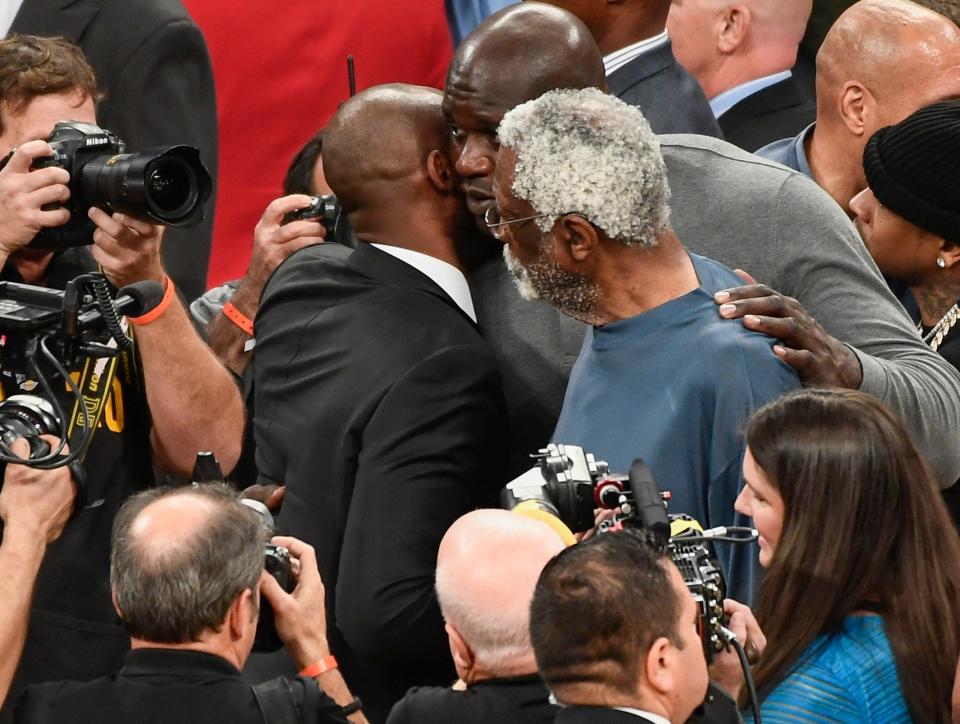Bill Russell roared with a deep voice and cackled in a high pitch. Gosh, he cackled, often at something he said at the expense of himself.
It was always a joy to hear Russell laugh after he finished telling a story. Everyone around him had a smile, wanting to hear every last word he had to say.
Russell died on Sunday at 88 years old, and what a life he lived: 11-time NBA champion, five-time MVP and an influential voice on social and racial issues, rising from modest beginnings to one of the most celebrated and respected athletes in history.
I won’t pretend and say I knew Russell. But I had the opportunity to spend time around him – in Washington DC the day before he received the Medal of Freedom from President Barack Obama in 2011, at various All-Star Games and a few times, we talked on the phone.
I know someone who was close to Russell, and if I needed Russell for something (and it better be for something big), there was always a good chance I could talk to him.
It was not only my treat, it was an honor. In this business, you’re never in awe of the people you interview. You are doing a job.
With Russell, it was different. I never covered him as a player (I was a year from birth in his final NBA season) or as a coach or executive.

OBITUARY: NBA legend Bill Russell, who won 11 NBA titles with the Boston Celtics, dies at 88
REACTIONS: Basketball world reacts to the death of Celtics great, NBA pioneer Bill Russell
OPINION: Bill Russell’s best achievement was being one of the great civil rights heroes
I couldn’t help but be in awe because of who Russell is and what he represents – a team-first champion with a courageous social conscience. There’s not many times in a sportswriter’s life where you get to spend time with a person like Russell who was a big part of NBA and US history.
By the time I started talking with Russell in the early 2010s, he was unfiltered. Remember when Russell flipped off Charles Barkley at the 2018 NBA Awards show? I remember talking to Russell about LeBron James winning his fourth MVP, and Russell was on the other end of the line dropping F bombs and I’m trying to remain focused yet thinking, “Bill Russell is dropping F bombs in this interview!”
When Russell turned serious, even on the topic of basketball, he had something to say and it always revolved around winning championships and team play.
“I enjoyed playing with all the guys I played with and the better they played, the better I liked it,” Russell told me in 2013 when James won his fourth MVP. “Anybody I played with who helped our team win, I loved playing with them. Would I have loved playing with LeBron? Of course.”
At All-Star Games in which Russell attended, I always kept my eye on him. Often seated courtside next to other NBA luminaries such as Oscar Robertson, Kareem Abdul-Jabbar, Jerry West and Julius Erving, Russell greeted modern star after modern star who came over to express their gratitude.
Today’s NBA greats recognized Russell’s importance. Look at the photos of James and Kobe Bryant receiving the Finals MVP award – the Bill Russell MVP Award – and you can see the respect they have for him on their faces.
Russell’s life philosophy, which also worked in basketball, was instilled in him from his father, Charlie Russell. “We didn’t have much, but there is something my father said: ‘It is not what you give, but what you share, for the gift without the giver is bare.’ My father’s philosophy was, ‘Always share what I have.’ “
Russell was aware of his greatness on the court as measured against others. More than once, he told me a version of this, “What I think about (James) is what I used to think about Wilt (Chamberlain), and like I told Wilt one time, ‘I think I’m the only guy on the planet who really knows how good you are because I’ve seen you up close.’ “
In 2011, an NBA public relations staffer asked if I wanted to spend the day with Russell in Washington before he received the Presidential Medal of Freedom. Mostly, I was a fly on the wall in a hotel as CNN’s John King interviewed Russell. I had my chance to interview Russell at the end of their conservation, and then we moved to the Lincoln Memorial on the National Mall – where Martin Luther King Jr. delivered his “I Have a Dream” speech in 1963, with Russell in attendance.
Russell alternated between telling funny and serious stories that day.
After moving from West Monroe, Louisiana to Oakland, California, a teacher asked Russell to join the choir. “You are looking at the first black guy who got kicked out of a white choir because he couldn’t sing,” Russell said.
He let out one of his gregarious cackles.
Then, he spoke of his father, who late in life finally told his son that he loved him and was proud of him.
After learning he would receive the Medal of Freedom, Russell drove from Seattle to Oakland and visited his father’s grave.
“You know, I have to agree with you. I did OK,’ ” he said.
Another Russell cackle.
Those are the days you never forget.
This article originally appeared on USA TODAY: Bill Russell’s legacy: He awed athletes and sportswriters alike